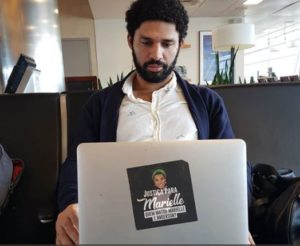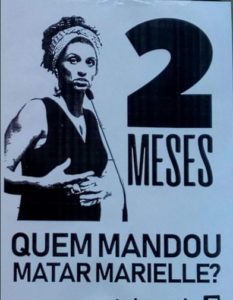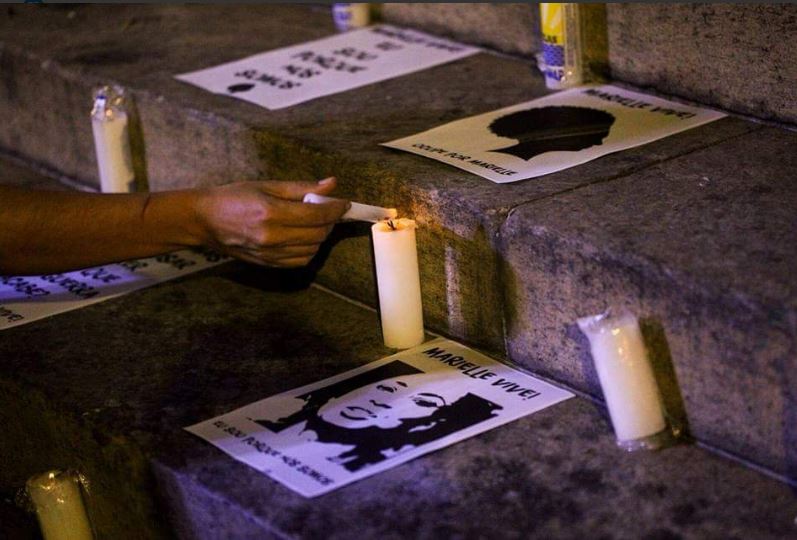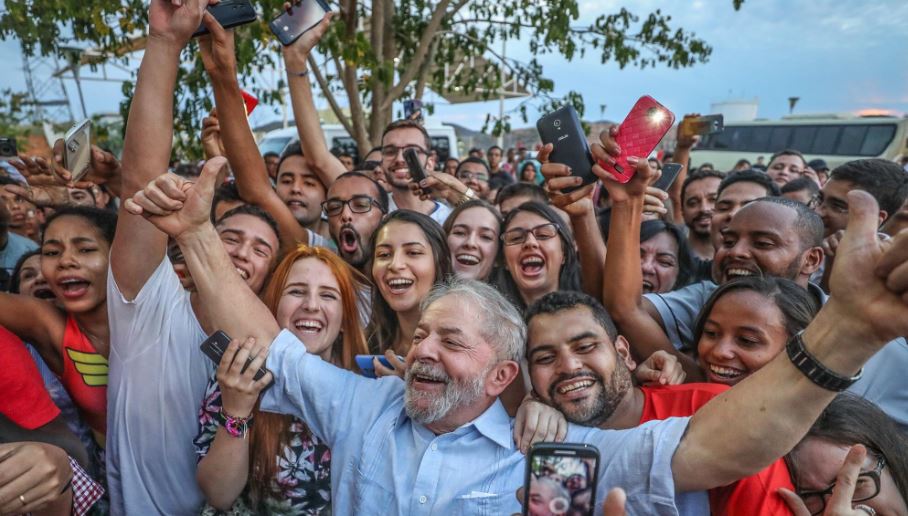A key witness, who remains unnamed for security reasons, has come forward to Rio’s Civil Police Force with important allegations regarding the assassination of city councilwoman Marielle Franco and her driver Anderson Gomes on 14th March.
The female witness made three statements to the Homicide Division of the Police Force in an exclusive that was first published by Brazilian daily O Globo on 8th May. In her testimonies, she divulges names of the two men she believes ordered Marielle’s assassination, their potential motives for the killing and key evidence regarding further homicides related to the crime.

Photo courtesy of @vereador_rj: Twitter.
The accused have been named as Franco’s colleague and fellow city councillor Marcello Siciliano, and ex-military policeman Orlando Oliveira de Araújo, currently under investigation for heading up a militia group in Curicica, Rio’s West Zone.
Different from criminal gangs, Brazilian militia groups are primarily composed of retired military policemen who decide to take security into their own hands. In this sense, the groups could be compared to paramilitary-style forces, although are somewhat different to the conventional notion of paramilitary groups. Militia groups in Brazil tend to control a large proportion of favelas and certain illegal industries that operate within them, disguising themselves as being there for security purposes.
After these groups took control of the witness’ community and threatened her with death two years ago, she claims she was forced to work as a security guard for former military chief Orlando. “Either I died, or I entered the paramilitary group,” she explained to O Globo, describing the ultimatum she was given.
Her close professional relationship with the ex-militia leader therefore gave her access to information and timings of meetings between the two suspects, starting in June last year, in which they allegedly planned Marielle’s murder. She claims she was a first-hand witness to at least four of the conversations between the two men.
In her testimony, she details one particular meeting between the city councillor and ex-militia chief, which took place on the Avenida das Américas, in Recreio dos Bandeirantes, Rio’s West Zone. She outlines a vital conversation between the two in explicit detail.
 The witness claims Siciliano made a remark about his fellow former councillor implying he set out to harm her, “We have to do something about the Marielle situation. The woman is getting on my nerves.” Following this, he allegedly slammed his hand down on the table and shouted, “Marielle, Freixo’s bitch,” referring to the PSOL member (Brazil’s Socialism and Liberalism Party) and city councillor Marcelo Freixo, with whom Marielle worked closely on investigations into Rio’s largest militia groups a decade ago. The conversation allegedly ended with the threatening comment “We need to sort this out soon,” coming from Siciliano, while he looked at the militia leader.
The witness claims Siciliano made a remark about his fellow former councillor implying he set out to harm her, “We have to do something about the Marielle situation. The woman is getting on my nerves.” Following this, he allegedly slammed his hand down on the table and shouted, “Marielle, Freixo’s bitch,” referring to the PSOL member (Brazil’s Socialism and Liberalism Party) and city councillor Marcelo Freixo, with whom Marielle worked closely on investigations into Rio’s largest militia groups a decade ago. The conversation allegedly ended with the threatening comment “We need to sort this out soon,” coming from Siciliano, while he looked at the militia leader.
On top of the accusations, the witness also provided names of the four assassins allegedly sent to murder Marielle, now all being investigated by the police.
As part of his work as a city councillor, Freixo’s expansion into Rio’s West Zone and increasing influence in communities controlled by militia gangs made him a likely target, as is the norm for those who resist militia control in Brazil. However, as pointed out by journalist Glenn Greenwald in an America’s Quarterly podcast about Marielle’s death, Freixo’s heightened personal security made him more difficult to kill. Marielle, on the other hand, was an easier target.

Photo courtesy of @ggreenwald: Twitter.
Speaking to Brazil Reports, Marielle’s close personal friend and fellow city councillor David Miranda, who also belongs to the same minority groups that she represented, supports Greenwald on this, “I am sure it was an execution, a political crime, committed by someone who wanted to silence Marielle, who was a very feisty city councilwoman.” Following the Edwards Snowden leaks case in 2013, both Greenwald and Miranda founded “adversarial” journalism outlet The Intercept.
Both accused had grounds for mounting a vendetta against Marielle. Even though technically under arrest for leading a militia group in Curicica, ex-military policeman Orlando owns a community in Vila Sapê, which was allegedly at war with drug traffickers in the Cidade de Deus favela. Through Franco’s support for the members of the Cidade de Deus community, according to the witness, there was a moment during which Marielle bribed Orlando, who had some electoral stronghold in the area. “She was the voice of favela residents against their oppressors, against militias, against inequality imposed by public power,” echoed Miranda. However, the two later fell out via associations of Vila Sapê and Cidade de Deus residents.
It could also be possible that city councillor Siciliano holds his own grudge against Franco for a in Rio de Janeiro’s Câmara dos Deputados in August last year. “My word, as a woman, counts too. It’s not just male words that count,” she said into the microphone, in front of the whole assembly, warning him not to make jokes about the visibility of the lesbian community.
https://www.youtube.com/watch?v=tDTIQAIZeNA
It was in Marielle’s nature to be strong-willed and opinionated, Miranda says, “she was a young, poor, black girl who spent years of her life fighting to climb steps that she would never have managed if she hadn’t been so determined and full of ideas.” He spoke affectionately of his dear friend with whom he shared a similar background, claiming she was “always smiling and affectionate.”
Meanwhile, Siciliano has denied all allegations against him, maintaining that they are “totally false” and claims to have never met the former militia leader. His family is now being threatened.
Planning for the assassination allegedly started a month before the event took place, with the criminal disguising of a car, the Cobalt from which Franco’s killers fired their bullets. The witness also claims that Marielle was being followed for a while before her death, by a man who has now been named as Thiago Macaco.

Photo courtesy of @Alexandre Pereira: Facebook.
As part of her testimony, the witness also confirmed that another recent assassination, less than a month after Franco’s death, was The body of 37-year-old Carlos Alexandre Pereira Maria, who worked for Marcelo Siciliano as a collaborator and was one of the eight members of Rio’s Câmara Municipal members to testify in the investigation into Marielle’s death as witnesses, was found inside a car on 6th May.
According to a witness, reported in O Globo, the assassin shouted, “We have to shut his mouth!” and subsequently opened fire. Siciliano’s collaborator, also known as Alexandre Cabeça, was a leader of community projects and often documented his work on social media.

Photo courtesy of @mariellefranco: Twitter.
As Marielle’s supporters continue to demand the truth and work on passing legal projects she herself was unable to see through, Miranda emphasises that they are pressing the police to resolve the crime as quickly as possible. More than two months have now passed since the deaths of Marielle and Anderson without definitive answers, and the question on everyone’s lips is: what took the witness so long in coming forward to the police?
With reference to the development of the investigations, Miranda emphasised the need for proof of the witnesses’ accusations before anything is able to proceed. “We are awaiting the conclusion of the investigations…of course we are in a hurry for the crime to be solved, and we will continue to put pressure on and demand justice for Marielle and Anderson,” he said.
In the words of Miranda, Marielle’s death signified, “the loss of a renewed politics” for Brazil, “one of confrontation, seriousness and the representation of the oppressed tiers of our society”. In her death, not just one voice was lost, but the voice of many, Brazilians who didn’t have a voice, he explained. Now, it is the turn of those voices to speak up and continue to demand justice for the loss of the glimmer of hope they now mourn, as reparation looks to be on the horizon.










